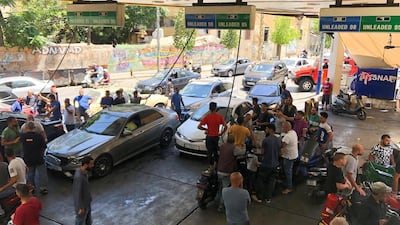A Lebanese judge has forced some petrol stations to reopen amid severe fuel shortages and clashes with motorists who have had to wait for hours to fill up.
Raids occurred after Prosecutor General Ghassan Oueidat issued a decision on Monday to prosecute owners of petrol stations who refuse to sell fuel, the state-run National News Agency reported.
Mount Lebanon judge Samer Lichaa visited petrol stations in the Beirut suburbs over the past two days and ordered them to reopen immediately.
“Citizens began flocking to them,” the NNA said on Tuesday.
Lebanon's judiciary is trying to force petrol stations to sell their stock but this is not a solution to shortages, said one operator.
"The problem comes from the central bank's subsidy programme," he told The National.
The country's cash-strapped central bank is struggling to maintain subsidies on fuel, wheat and medicine, which were enacted in October 2019 as the country started sliding into its worst-ever economic crisis.
Riad Salameh, the governor of the central bank, has repeatedly said in the past months that the bank would lift subsidies soon. The government has yet to come up with a plan.
As a result, importers, who need approval from the central bank before buying subsidised goods, have slowed down their purchases, causing shortages.
Petrol stations are closing or capping sales, which has caused long queues and traffic jams in large cities.
“Some petrol stations are trying to limit sales to make the fuel last longer, some are stockpiling in the hope of making gains once subsidies are lifted and some really have nothing left,” the operator said.
He said fuel imports ground to a halt last week after the central bank stopped subsidising fuel purchases at the now largely defunct official exchange rate of 1,500 Lebanese pounds to the dollar.
Ships carrying fuel continued to arrive to Beirut port but have not been able to unload their shipments without the central bank's approval, the station operator said.
Different exchange rates have developed since the start of the crisis.
The official rate is still in place but the true market value of the Lebanese pound is widely considered to be found in the parallel market, where $1 is now worth about 15,000 Lebanese pounds.
Banks apply an artificial rate of 3,900 Lebanese pounds to the greenback for depositors with dollar accounts.
A central bank representative told The National to contact caretaker energy minister Raymond Ghajar, who was not immediately available for comment.
Lebanon’s political class has been paralysed by infighting since a devastating explosion at Beirut port last August.
Members of the Lebanese Parliament have floated the idea of ration cards for the country’s most vulnerable but have failed to vote on a law to enact the proposal.
The head of the fuel distributors’ syndicate, Fadi Abou Shakra, said on Tuesday that Mr Ghajar told Parliament last week that the central bank had told him it could only continue subsidising fuel imports at the bank rate of 3,900 Lebanese pounds.
But caretaker prime minister Hassan Diab does not want to be blamed for a sharp increase in fuel prices and has asked for Parliament’s approval, the petrol station operator said.
“We’re blocked unless they find a solution by the end of the week."
More than 140 petrol stations stopped buying fuel from importers on Tuesday because they feared clashes with frustrated motorists, Mr Abou Shakra said.
“They are exposed to problems, robbery, beatings and could not protect themselves."









